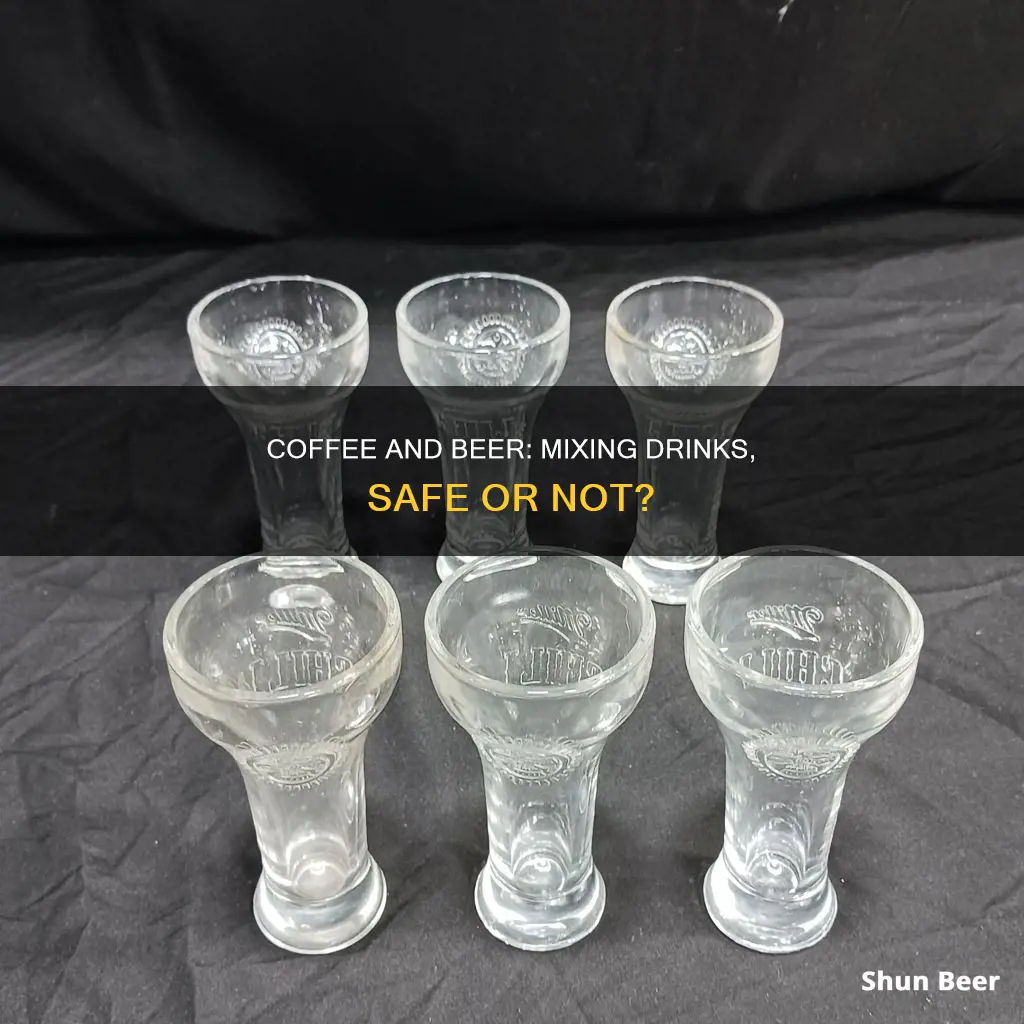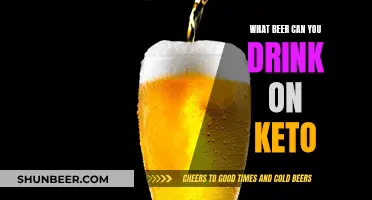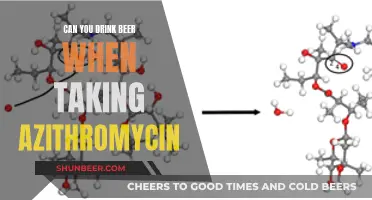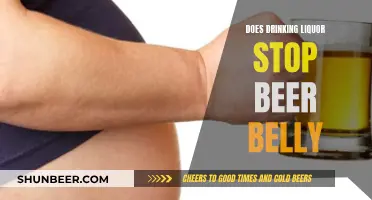
Drinking coffee and alcohol together is a common practice, but it's not without risks. Caffeine and alcohol have opposing effects on the body, with caffeine being a stimulant and alcohol a depressant. When consumed together, they can counteract each other, leading to a range of side effects and increasing the risk of certain problems. While drinking coffee after alcohol may seem like a good way to sober up, it won't reduce your blood alcohol level and can lead to drinking more alcohol than intended. This practice can have several negative consequences, including an increased risk of binge drinking, alcohol poisoning, and other alcohol-related incidents. Additionally, both substances are diuretics, which can lead to dehydration if not careful. Understanding the potential risks associated with mixing coffee and alcohol is crucial to making informed decisions about their consumption.
| Characteristics | Values |
|---|---|
| Effect on alertness | Caffeine can make you feel more alert and energetic. |
| Masking of alcohol effects | Caffeine can mask the effects of alcohol, making you feel less drunk than you are. |
| Risk of overdrinking | The masking effect of caffeine can lead to drinking more alcohol than usual, increasing the risk of alcohol poisoning, binge drinking, and alcohol dependence. |
| Dehydration | Both caffeine and alcohol are diuretics, which can lead to dehydration and associated symptoms such as dizziness and lightheadedness. |
| Heart health | Mixing caffeine and alcohol can increase blood pressure and the risk of cardiovascular issues, including irregular heartbeat. |
| Sleep | Caffeine and alcohol can disrupt sleep patterns and increase the risk of long-term sleep issues. |
| Digestive issues | Caffeine can worsen digestive problems such as irritable bowel syndrome (IBS) and contribute to dehydration. |
What You'll Learn

Coffee doesn't sober you up, but it can mask alcohol's effects
Coffee Doesn't Reduce Alcohol in Your System
It's a common misconception that coffee can lower your blood alcohol level or help your body clear alcohol faster. However, caffeine has no impact on the way your body metabolizes alcohol. So, even if you feel more alert after drinking coffee, it won't reduce the amount of alcohol in your system or make you less drunk.
Coffee Can Mask Alcohol's Effects
Caffeine is a stimulant, while alcohol is a depressant. When combined, they can have opposing effects on your body. Coffee can mask the sedative effects of alcohol, making you feel more alert and energetic than you normally would while drinking. This can be dangerous because you might not feel the full effects of alcohol, leading to a false sense of sobriety.
Increased Risk of Overdrinking
When you don't feel the full effects of alcohol, you're more likely to drink more than usual. This increases your risk of drinking too much, which can lead to alcohol poisoning, intoxication, or other harmful consequences. The masking effect of caffeine can impair your judgment and make it difficult to assess when you've had enough to drink.
Health Risks and Side Effects
Mixing caffeine and alcohol can have several health risks and side effects. It can increase your blood pressure and the risk of cardiovascular issues such as heart disease, heart attacks, and irregular heartbeats. Additionally, it can disrupt your sleep patterns, leading to potential heart conditions. Mixing these substances can also increase the risk of alcohol dependence and physical harm.
Behavioral Effects and Risky Behaviors
Studies have shown that mixing alcohol and caffeine is associated with an increased likelihood of binge drinking, especially among younger individuals. It can also lead to a higher prevalence of risky behaviors, such as riding with a drunk driver or engaging in activities that result in injuries. Additionally, there is a higher chance of experiencing or perpetrating unwanted sexual advances while under the influence of this combination.
In conclusion, while coffee doesn't sober you up, it can mask the effects of alcohol. This may lead to overdrinking and a range of health and behavioral risks. It's important to be aware of these potential consequences and consume caffeine and alcohol with caution.
Miller Beer Text Rebates: How Do They Work?
You may want to see also

Mixing caffeine and alcohol may lead to binge drinking
Caffeine and alcohol are two very different substances with opposing effects on the body. Caffeine is a stimulant that makes you feel more alert and energetic, while alcohol is a depressant that slows down your reactions and makes you feel drowsy. When mixed, these substances can have a dangerous interplay, with caffeine masking the effects of alcohol and potentially leading to binge drinking.
The masking effect of caffeine on alcohol is well-documented. Caffeine can make you feel more alert and energetic, even when alcohol is also in your system. This can lead to a false sense of sobriety, where individuals believe they can handle more alcohol than they normally would. As a result, they may drink more than usual, increasing the risk of alcohol-induced injuries, accidents, or poisoning. This phenomenon is known as "binge drinking", and it has been observed especially in younger adults and students.
Several studies have linked the mixing of alcohol and caffeine to an increased risk of binge drinking. One study found that students who binge drank were twice as likely to mix alcohol with energy drinks compared to non-binge drinkers. Another study of undergraduates revealed that those who regularly consumed energy drinks were more than twice as likely to have alcohol-related incidents. These incidents included riding with a drunk driver, injuries, and a higher number of episodes of intoxication in a week.
The combination of caffeine and alcohol can also lead to other risky behaviours. One study found that students who consumed caffeinated alcoholic beverages (CABs) were more likely to report receiving unwanted sexual advances while intoxicated. Additionally, individuals who mixed alcohol and caffeine also had a higher chance of making unwanted sexual advances towards others. This finding is particularly concerning, as sexual assaults are more likely to occur in environments where alcohol is consumed, such as bars or parties.
Mixing caffeine and alcohol can also have detrimental effects on the body. Both substances are diuretics, which can lead to dehydration. Additionally, the combination can cause an irregular heartbeat (atrial fibrillation) and increase blood pressure, posing a risk for individuals with heart conditions. The mixture can also disrupt sleep patterns, which can further contribute to heart-related issues.
In conclusion, mixing caffeine and alcohol can lead to a dangerous cycle of over-drinking and increased health risks. The masking effect of caffeine can lead to binge drinking, and the combination of substances can increase the likelihood of risky behaviours and adverse health consequences. It is essential to understand the potential dangers of mixing these two substances to make informed decisions about their consumption.
Miscarriage Recovery: Beer and Alcohol Consumption
You may want to see also

It can cause an irregular heartbeat
Drinking beer after coffee may cause an irregular heartbeat, a condition known as atrial fibrillation or AFib. This is when the heart's two small upper chambers beat irregularly and too fast, which can lead to stroke, blood clots, and other serious medical issues.
A study published in the Heart Rhythm journal surveyed 1,295 patients with symptomatic paroxysmal AFib, and found that 28% of them cited coffee drinking as a trigger for their AFib episodes. While the study did not establish a causal link, the findings suggest a correlation between caffeine consumption and irregular heartbeat.
Mixing caffeine and alcohol can also raise your blood pressure, which further increases the risk of atrial fibrillation. The combination of a stimulant and a depressant can mask the effects of alcohol, leading to overconsumption and an increased risk of alcohol-related incidents.
It is important to note that individual sensitivity to caffeine varies, and some people may be more susceptible to the effects of caffeine on heart rhythm than others. Therefore, if you have a heart condition or experience palpitations, it is advisable to avoid combining caffeine and alcohol or consult your doctor for personalized advice.
While the occasional Irish coffee or rum and Coke is unlikely to cause harm, it is generally recommended to avoid mixing caffeine and alcohol. Understanding the potential risks associated with combining these substances can help make more informed decisions about your health and well-being.
The Science of Beer Tubes: How Do They Work?
You may want to see also

It can increase the risk of alcohol poisoning
Mixing beer and coffee, or more specifically, caffeine and alcohol, is generally not recommended. While it might not seem harmful to have an occasional Irish coffee or a beer with an espresso shot, mixing caffeine and alcohol can have serious health consequences. One of the main risks is the increased chance of alcohol poisoning or overdose.
Caffeine is a stimulant, while alcohol is a depressant. When mixed, the stimulant effects of caffeine can mask the depressant effects of alcohol. In other words, caffeine can make you feel more alert and energetic, potentially giving you the false impression that you are less drunk than you actually are. This can lead to drinking more alcohol than usual, increasing the risk of alcohol poisoning.
Alcohol poisoning is a dangerous and life-threatening condition. It occurs when there is so much alcohol in the body that areas of the brain responsible for vital life functions, such as breathing and heart rate, begin to shut down. Symptoms of alcohol poisoning include confusion, severe loss of coordination, being conscious but unresponsive, irregular or slowed breathing, difficulty staying conscious, and passing out. If someone displays these symptoms, it is crucial to seek immediate medical attention, as alcohol poisoning is considered a medical emergency.
The masking effect of caffeine on alcohol's effects can lead to a higher risk of alcohol poisoning, as individuals may not realize how intoxicated they truly are. They may continue drinking, thinking they are more capable and alert than they are, which can result in consuming dangerous amounts of alcohol.
Additionally, mixing caffeine and alcohol can increase the likelihood of binge drinking and alcohol dependence, further elevating the risk of alcohol poisoning. Binge drinking, which is more common among those who mix caffeine and alcohol, involves consuming a large quantity of alcohol in a short period, often leading to a rapid increase in blood alcohol levels. Regularly binge drinking and mixing caffeine with alcohol can contribute to a higher risk of alcohol poisoning episodes.
To reduce the risk of alcohol poisoning, it is generally advised to avoid mixing caffeine and alcohol. If choosing to consume both, it is important to do so infrequently and in moderation, being mindful of both caffeine and alcohol intake. Planning ahead, drinking with trusted individuals, and arranging a safe ride home are also recommended strategies to minimize risks.
Beer Tube Screens: How Do They Work?
You may want to see also

It can lead to heightened anxiety
Drinking coffee and beer together can lead to heightened anxiety. Caffeine is a central nervous system stimulant and consuming too much can lead to symptoms of anxiety. These symptoms can include restlessness, feelings of uneasiness, and a rapid heartbeat.
Caffeine blocks adenosine receptors, increasing dopamine, noradrenalin, and glutamate. This increases blood pressure and heart rate. Lower doses of caffeine can improve motor activity and alertness, while higher doses can produce symptoms of anxiety.
Genetic studies have found that adenosine receptor genes play a role in the development of anxiety. This suggests that some individuals may have an increased risk of anxiety disorders and that caffeine may make them more susceptible.
The Diagnostic and Statistical Manual of Mental Disorders (DSM-5) lists caffeine-induced anxiety disorder as a condition in which caffeine interferes with daily functioning. Caffeine increases alertness by blocking adenosine, a brain chemical that makes you feel tired, while triggering the release of adrenaline, which increases energy. If the amount of caffeine is high enough, these effects are stronger, resulting in caffeine-induced anxiety.
People with panic disorder and social anxiety disorder are especially sensitive to caffeine. A 2005 study noted that excessive caffeine consumption can lead to symptoms similar to psychiatric conditions, including sleep and anxiety disorders, increased hostility, anxiety, and psychotic symptoms.
Beer Bar Memberships: Are They Worth the Cost?
You may want to see also
Frequently asked questions
It is not recommended to mix caffeine and alcohol. Caffeine can mask the effects of alcohol, making you feel more alert and capable than you are, which can lead to drinking more alcohol than intended. This increases the risk of alcohol poisoning, binge drinking, and alcohol dependence.
Mixing caffeine and alcohol can have several negative consequences, including an increased risk of:
- Alcohol poisoning
- Binge drinking
- Alcohol dependence
- Physical harm
- Dehydration
- High blood pressure
- Irregular heartbeat
- Sleep disturbances
- Digestive issues
Caffeine is a stimulant that increases alertness and energy levels, while alcohol is a depressant that slows down brain activity and causes drowsiness. When combined, caffeine can mask the effects of alcohol, leading to a false sense of sobriety and increased alcohol consumption.
It is generally recommended to avoid mixing caffeine and alcohol. If you want to drink beer, consider having a non-caffeinated beverage beforehand or opting for a lower-alcohol beer. If you want to stick with coffee, choose a decaffeinated option or limit your alcohol intake.







